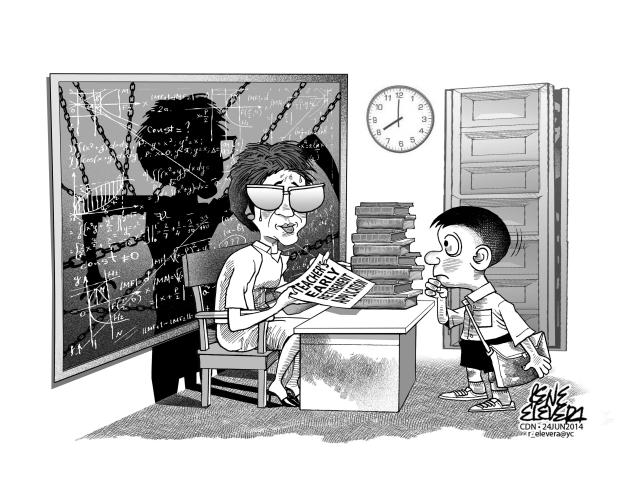The proposal of 1 BAP party-list Rep. Silvestre Bello III to lower the retirement age for teachers by five years should be seriously considered by Congress following an overhaul of the country’s educational system.
The K to 12 program which adds a few more years prior to high school will require additional teaching for teens, a challenge which quite a few veteran teachers may not be up to facing, let alone actually doing.
According to Bello, the veteran teachers are too set in their ways to be able to adopt to the changing attitudes and mindset of children and teenagers. That’s the general view though there are quite a number of teachers especially in the private sector that have adopted easily to changes in teaching styles particularly in the use of technology to enhance the learning experience of students.
Bello must have public school teachers in the countryside in mind when he crafted this piece of legislation and for the most part he is correct, not just because these teachers experience burnout long before retirement age creeps in but also due to environmental factors outside their control like the lack of adequate classrooms and teaching materials.
One only needs to ask the teachers employed in towns and provinces hit by supertyphoon Yolanda to get an idea of the frustration and overwhelming sense of despair and dejection they feel at having to teach a large number of students who have to make do with recycled uniforms and school materials.
Teachers employed in private schools have it easier, though they also have to deal with higher costs of living which force them to moonlight on other jobs at the cost of their health.
As always, the crux of the issue is determining if the veteran teachers can afford to retire at 60 years old or take the option of retiring five years earlier from a financial standpoint.
Again, public school teachers face the hard choices because delayed salaries force them to take out loans or even find other jobs to make both ends meet. Longer hours and larger classes eventually take their toll on even young teachers and not a few are willing to teach a few more years past their retirement age if they have debts to settle.
Obviously, the solution would be to find safety nets for retiring teachers, like a proposal by the Quezon City Council to offer stipends for their teachers and retiring government workers.
How many local government units can afford to provide that incentive? The Cebu city government would likely do so but not every town, city and province can give their teachers this incentive.
The private sector can perhaps enter the picture by setting up an educational fund to take care of the retiring teachers. That’s the least they can do for those who first taught and inspired them to dream and guided them on how to achieve these dreams.
